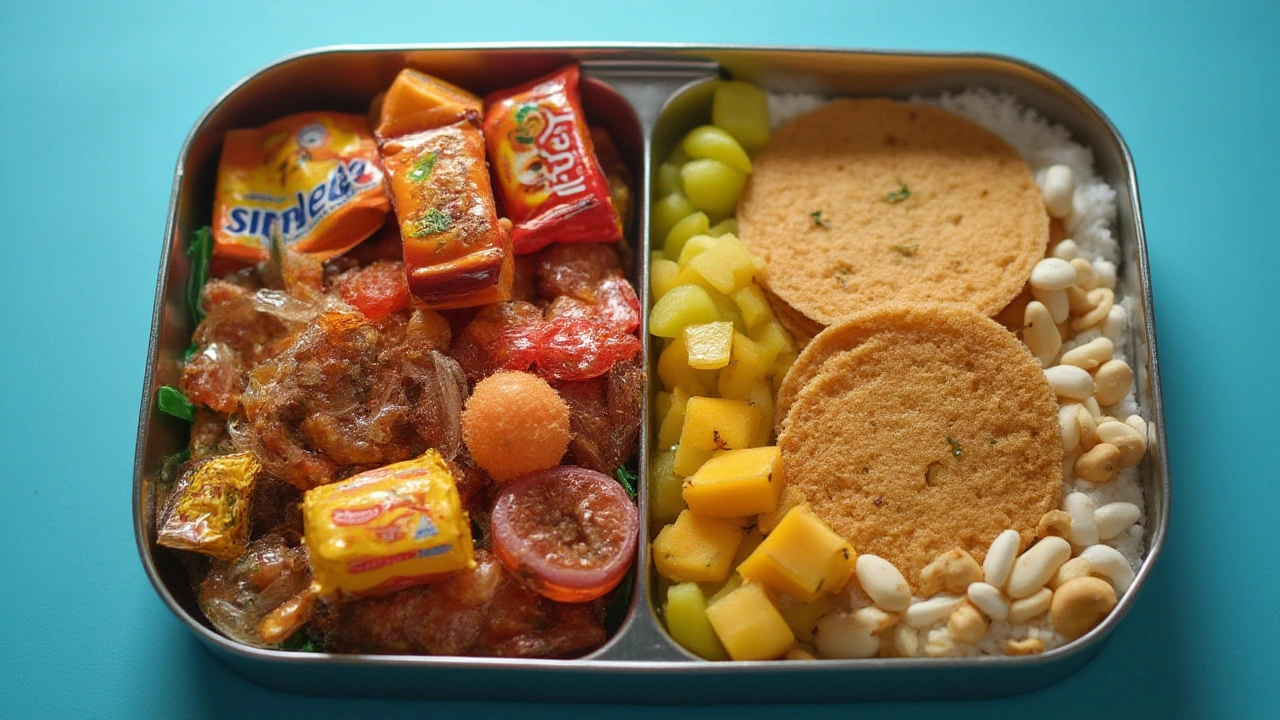The Most Unhealthy Food in the World: Surprising Facts and Nutrition Risks
 Jul, 28 2025
Jul, 28 2025
You’d think the world’s most unhealthy food would be hiding in some obscure packet with a skull and crossbones, but nah. It’s right out in the open. If you’ve grabbed a late-night snack or hit the shops for lunch, you’ve already seen it. This food is everywhere—on your mate’s kitchen bench, bundled up at kids’ parties, and even sneaking into your Netflix marathon. The truth stings a bit: the number one unhealthy food isn’t something bizarre or hard to find. It’s the humble, almost boring, ultra-processed potato chip.
Why Potato Chips Dominate the 'Unhealthy' List
Chips might seem harmless—just slices of potato, right? Not even close. What turns the chip from cheeky side snack to heavyweight health villain? It’s the way it’s made. Lay’s, Smith’s, Pringles—pick any brand, the process pretty much looks like this: thinly-sliced spuds are deep-fried in vegetable oil at terrifyingly high temperatures. Then comes the heavy hand with salt and artificial flavors. Science folks call the final result an ‘energy dense,’ ‘nutrient-poor’ food, loaded with simple carbs, fat, and sodium—but basically nothing good for your body. Crunch one, and you barely scratch the surface of its damage.
Let’s break it down. In Australia, the average 45g single-serve packet packs about 950 kilojoules (over 220 calories), close to a quarter of the daily salt limit, and more than ten percent of your fat intake for the entire day. Chips are also full of acrylamide—a chemical formed from frying starchy foods at high heat, linked with increased cancer risks. Look at the numbers: a 2021 report by Cancer Council NSW found that Aussies were munching through 50,000 tonnes of chips each year. And it’s not just the numbers—chips are designed for ‘bliss point.’ This is the perfect ratio of fat, salt, and crunch, so your brain lights up and you keep reaching for more.
It’s not just about chips being bad for you on their own. They take the top unhealthy spot because they check every box: super easy to overeat, low in nutrition, and totally linked with weight gain, high blood pressure, and heart disease. There’s good research showing people who eat more ultra-processed foods like chips have a much higher risk of dying early (a Brazilian study tracked 45,000 adults for 8 years—those eating the most ultra-processed food had a 30% higher risk of early death). That’s not a cute stat to have on your Sunday barbecue chip bowl.
The Hidden Ingredients Behind the Crunch
What’s actually in a standard store-bought chip? Flip over a packet and you’ll feel like you’re reading chemical instructions. Start with the obvious—potatoes, oil, salt. Then come the extras: dextrose, maltodextrin, emulsifiers, anti-caking agents, flavor enhancers (MSG anyone?), powdered cheese, fake barbecue smoke, and a dose of preservatives to keep everything “fresh.”
The main villain goes unnoticed: trans fats, though many brands try to claim zero these days, sneak in through certain oil choices and repeated frying. Trans fats punch holes in your arteries, raise bad LDL cholesterol, and drop the good HDL kind. The World Health Organisation says no amount is safe. Some countries, like Denmark, ban them outright. Australia has ‘voluntary’ guidelines, which means you’ll still find them in lots of popular Aussie brands.
The sodium—way above the amount you need—raises your blood pressure. For an adult, more than 2,000mg per day gets dangerous. A small chip packet often has 350mg or more. That's before you factor in the rest of your meals for the day. Ever noticed that when you eat chips, you barely get full? That’s the missing fiber and protein. All you get is empty energy your body turns straight into stored fat. Crash loading your system with these kinds of simple carbs not only adds weight but can mess with your blood sugar, leaving you tired or groggy later.
To keep chips shelf-stable for months, food manufacturers load them with antioxidants and chemical flavor blends. Pick any flavor—Salt & Vinegar, Chicken, Sweet Chilli—the ingredient list grows longer and more unrecognizable. If it takes a chemistry degree to figure out what you're eating, it's safe to say your body won’t like it either.

Data and Real Damage: How Chips Impact Your Health
Numbers are harsh, but facts matter. Take a look at the following table about an average 45g packet of regular salted chips (approximate per-serve values):
| Component | Amount per 45g packet | Recommended Daily Intake | % Daily Limit |
|---|---|---|---|
| Calories | 220 kcal | 2000 kcal (average) | 11% |
| Fat | 13g | 61g | 21% |
| Sodium | 350mg | 2000mg | 17.5% |
| Fiber | 1g | 25g | 4% |
| Protein | 2g | 50g | 4% |
Researchers have watched for years what happens if chips become a daily thing. Harvard’s Nurses’ Health Study followed more than 120,000 women and men for 20 years. The number one food linked to long-term weight gain? Potato chips. Not chocolate, not ice cream. Eating just one more serving of chips per day led to an average weight gain of nearly 0.7kg every four years. That’s just for one serve… most people have more. Chips were also directly linked with increased risk of type 2 diabetes, hypertension, and higher cholesterol.
It’s not just theory. Hospitals in the UK and Australia report that kids as young as 12 are now showing up with high blood pressure and cholesterol, conditions that were once only seen in much older adults. At Royal Children's Hospital in Melbourne, doctors say the ultra-processed snack habit is a major part of the problem. Chips aren’t the only culprit, but they top the chart because they’re so addictive and easy to eat in excess.
And once the habit is set? Multiple studies show that people who eat more chips are also more likely to skip healthier foods like fruits, nuts, and veggies. The cycle repeats, and the damage gets baked in. Chips have a sneaky effect on your taste buds—making other foods taste bland—so you start to crave more salt and fat everywhere, not just from snacks.
Why We Keep Eating Them Anyway: The Psychology Behind Junk Food Addiction
So, if everyone knows they’re bad, why do we keep tearing open packet after packet? The secret is in food science. Manufacturers pay food engineers a lot to figure out just how to make chips impossible to stop eating. There’s even a name for it: “vanishing caloric density.” That means chips melt away in your mouth so fast, your brain doesn’t realize you’ve actually eaten anything. So, you keep eating more, chasing that crunch and salty zing.
The packaging is bright, fun, and often placed perfectly at supermarket checkouts or eye-level shelves. Those TV ads? They don’t just show someone eating chips—they show a group of friends laughing, relaxing, living their best life… all with a chip in hand. You’re not just buying food, you’re buying the feeling. Neuroscientists say salty snacks like chips activate the same reward centers in the brain as gambling does, releasing quick hits of dopamine. That's where the addiction cycle finds its grip.
Ever tried to eat just one chip and stop? No one has. Even if you come home and swear not to touch them, your brain will remember the flavor, crunch, and more—so the next time you’re tired or bored, you’ll grab another handful. That’s not about lack of willpower. It’s hardwired biology. When you finally do eat a whole family-sized bag, you don’t feel satisfied—you feel guilty and still hungry for real food. The feedback loop is broken.
Think about parties and social events. Chips are the ‘default’ snack, often the first thing people pile onto their plates. They’re affordable, require no prep, and everyone knows what to expect. But this easy habit translates to regular overeating and long-term health trouble we never see coming. And when you try to swap them out? People look at the veggie sticks like you’ve gone mad.

Breaking the Cycle: Smart Swaps and Simple Tips to Dodge the Trap
You don’t have to ditch chips forever to dodge their worst effects. But you can outsmart the system. The first hack: keep them out of your house. No food scientist has invented a ‘willpower’ strong enough to fight temptation staring from the pantry. If you must have a treat, go for a smaller pack—never eat straight from the big bag. Portion control is everything.
Swap your chips for whole-roasted chickpeas, lightly salted rice cakes, or popcorn popped without heaps of oil and sugar. Even oven-roasted potato wedges at home, with the skin on and less oil, are a massive step up. Air fryers were basically invented for this. Your taste buds will reset after a week or two—before you know it, regular chips start to taste weirdly greasy and too salty.
Craving crunch? Try carrots, celery, or even apple slices. If you want something more filling, reach for a handful of nuts (unsalted, if you can manage). These choices boost your fiber and protein, actually fill you up, and come with health benefits instead of damage. The trick here is to set yourself up to win. Prep your healthy snacks in advance so you don’t default to tearing open a bag of chips when you get hungry.
It helps to read labels and get picky. Some brands are now frying chips in better oils (like high-oleic sunflower oil), lowering salt, or even trying to sneak in more fiber (like bean chips or lentil crisps). While they’re still not “good” for you, they are less of a disaster than standard fried potato chips. Remember, just because it comes in a shiny packet and says “baked” doesn’t mean it’s healthy—check the numbers. Look for options with less than 400mg sodium per 100g, and fiber above 3g per serve if you can find it.
Lately, more cafes in Sydney—and honestly, pretty much globally—offer healthy snack plates instead of chip bowls. If you swap chips for dips like hummus and veggie sticks, that’s a taste win and a nutrition upgrade. Social pressure at parties and BBQs is real, but you’d be surprised how quickly people get into alternatives. Bring your own, and you’ll likely start a trend.
So yes, the *unhealthy food* champion is everywhere, ordinary, and hiding in plain sight. But the power to dodge its worst traps is in your hands (and pantry) every day. It's not about being perfect—just staying aware, and outsmarting the snack companies at their own addictive game.
